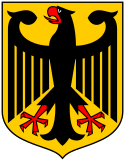West Germany men's national ice hockey team
 |
|
| First international | |
|---|---|
|
(West Berlin, West Germany; 18 November 1951) |
|
| Biggest win | |
|
(Unna, West Germany; 1 November 1981) |
|
| Biggest defeat | |
|
(Garmisch-Partenkirchen, West Germany; 14 March 1972) |
|
| IIHF World Championships | |
| Appearances | 29 (first in 1953) |
| Best result |
|
| Canada Cup | |
| Appearances | 1 (first in 1984) |
| Best result | 6th (1984) |
| Olympics | |
| Appearances | 10 (first in 1952) |
| Medals |
|
| Medal record | ||
|---|---|---|
| Olympic Games | ||
| 1976 Innsbruck | Team | |
| World Championship | ||
| 1953 Switzerland | ||
The West German national ice hockey team was a national ice hockey team created after World War II when Germany was split into East and West Germany.
Except in 1984, when it was invited to the Canada Cup, the West German team was not considered to be as elite as Canada, Sweden, the United States, Czechoslovakia, Finland or the Soviet Union, but it was often ranked high enough in the world by the IIHF to participate in international tournaments. By 1991, the team ceased to exist due to the re-unification of East and West Germany.
The biggest accomplishment from the West German team, came in 1976 at the Winter Olympics, when the team went 2–3–0 and won the bronze medal. The team's wins came against the United States (4–1) and Poland (7–4). The team also played well against the silver medalists, Czechoslovakia, and the gold medalists, the USSR.
In 1980, the team didn't do as well and only won one game in the preliminary round, which kept them from advancing. They finished 10th out of 12.
...
Wikipedia
